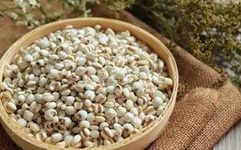
— Issue 97 —
Yiyiren (Coix Seed)
SEMEN COICIS
Introduction: The famous poet Su Shi from the Tang and Song dynasties wrote a poem: “Fubo rice with coix seed, the imperial pestilence is transmitted well. It can eliminate the poison of the five streams, but cannot save the harm of slander.” This describes the coix seed, also known as Yiyiren. Let us explore why Yiyiren is praised by Su Shi!
Alias
Jielie, Qishi, Ganmi, Yizhuzi, Qishi, Jiaonianzhu, Niutangzhu, Laoya Zhu
Source
It is the seed of the plant Coix lacryma-jobi, belonging to the Poaceae family.
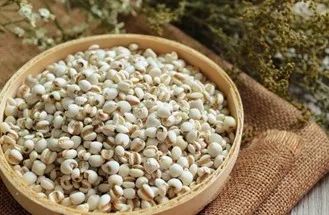
Habitat
Grows near houses, in wastelands, by rivers, streams, or in damp valleys. Generally cultivated. It is produced in most regions of China, mainly in Fujian, Hebei, and Liaoning.
Preparation
Roasted Yiyiren: Select clean coix seeds and roast them in a pan over low heat until slightly yellow, then remove and let cool. Alternatively, roast with bran (for every 100 jin of coix seeds, use 10 jin of bran); according to “Leigong’s Theory of Processing”: For every 1 liang of Yiyiren, use glutinous rice. If boiled with salty soup, it is a different preparation.
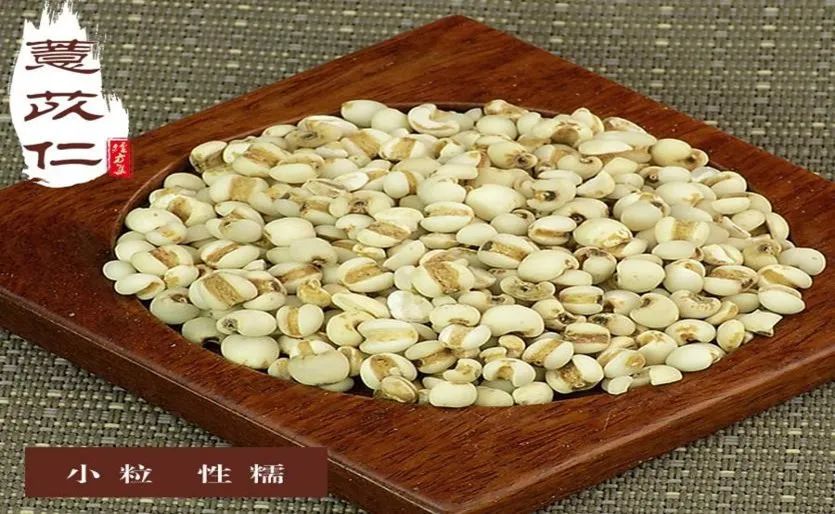
Dosage
Internal use: Decoction, 10-30g; or in pills, powders, soaked in wine, cooked in porridge, or made into soup.
Identification of Medicinal Material
Annual or perennial herb. The fibrous roots are relatively thick, with a diameter of up to 3 mm. The stem is erect, 1-1.5 meters high, with about 10 nodes. The leaves are linear-lanceolate, up to 30 cm long and 1.5-3 cm wide, with rough edges, a thick midrib, and a prominent back; the leaf sheath is smooth, with the upper part shorter than the internodes; the leaf tongue is hard, about 1 mm long.
Authenticity Identification
Unethical merchants often substitute coix seeds with grass seeds. Let us identify the differences between grass seeds and coix seeds:
1. Unhusked grass seeds and coix seeds: The seed coat of coix seeds is mostly yellow-brown, shiny, thin, and brittle, easily broken; the seed coat of grass seeds is mostly black-gray, shiny, thick, and hard, not easily broken.
2. Husked grass seeds: ① Size: Grass seeds are larger; coix seeds are smaller. ② Shape of the longitudinal groove on the seed’s belly: Grass seeds occupy one-half to two-thirds of the seed’s width, with a deeper groove; coix seeds occupy one-third to one-half or more of the seed’s width, with a shallower groove.
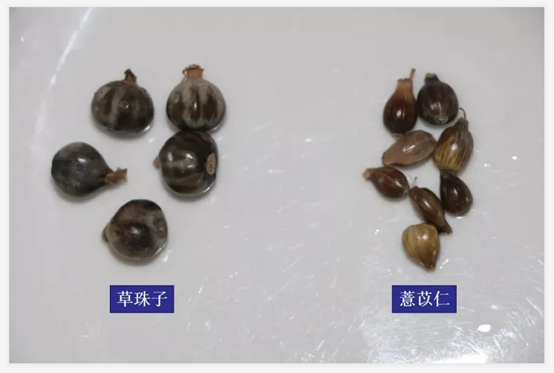
Interesting Facts
According to the “Book of the Later Han, Biography of Ma Yuan”, General Ma Yuan of the Eastern Han dynasty often consumed coix seeds while fighting in Jiaozhi due to the humid and hot climate, which helped him stay light and overcome the pestilence. When he returned victorious from pacifying the southern border, he filled a cart with coix seeds to cultivate them. Unfortunately, this act was used against him by malicious individuals, accusing him of hoarding treasures from the people. In anger, Ma Yuan publicly dumped the cart of coix seeds into the Li River, dispelling the rumors. The local people loved this honest and selfless general, naming the mountain by the Li River Fubo Mountain, and coix seeds earned the nickname Yizhuzi.
Clinical Applications
1. Used for urinary difficulties, edema, beriberi, and damp-heat conditions. Yiyiren promotes diuresis and drains dampness, with a relatively mild effect. However, due to its slightly cold nature, it can be used for damp-heat accumulation, and for short, red urination, it can be combined with Huashi (Talcum) and Tongcao (Plantago). For damp-heat pathogens in the Qi level, especially when dampness predominates, it can be combined with Xingren (Apricot Kernel), Cardamom, Bamboo Leaves, and Mutong (Akebia). This herb also has the function of strengthening the spleen, used for spleen deficiency with edema and beriberi, often combined with Fuling (Poria), Baizhu (Atractylodes), Mugua (Papaya), and Wuzhuyu (Evodia).
2. Used for diarrhea and leukorrhea. This herb can strengthen the spleen and drain dampness, thus suitable for diarrhea and leukorrhea due to spleen deficiency with dampness.
3. Used for damp obstruction, pain, and muscle spasms. This herb can eliminate dampness and relieve spasms, thus suitable for pain and spasms caused by dampness obstructing the skin and muscles, often combined with Guizhi (Cinnamon Twig) and Cangzhu (Atractylodes).
4. Used for lung abscess and intestinal abscess. Yiyiren can clear lung heat and drain damp-heat from the intestines, often used for internal abscesses, with the function of expelling pus and resolving abscesses. For lung abscess with chest pain and purulent sputum, it can be combined with Xianlugen (Reed Root), Dongguazi (Wax Gourd Seed), Taoren (Peach Kernel), and Yuxingcao (Houttuynia). For intestinal abscess, it can be combined with Baijicao (Patrinia) and Fuzi (Aconite).
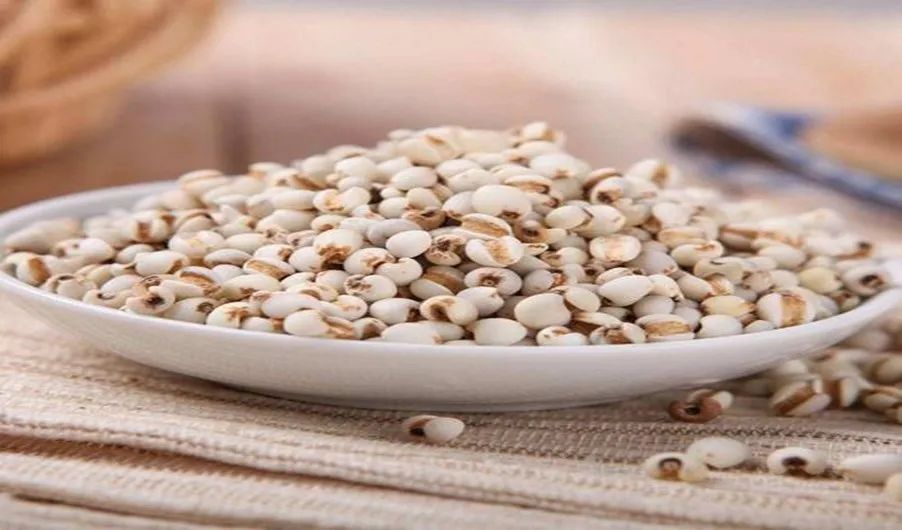
Formulas
① For wind-damp obstruction, limb weakness, and lumbar pain: 1 jin of Yiyiren, 4 liang each of Sangjisheng (Mulberry Mistletoe), Danggui (Angelica), Chuanxuduan (Chinese Teasel), and Cangshui (rice wash). Divide into 16 doses, decoct and take. (From “Guangji Fang”)
② For chronic wind-damp obstruction, tonifying Qi, benefiting the intestines and stomach, eliminating edema, and dispelling evil Qi from the chest: Grind Yiyiren into powder, cook with polished rice to make porridge, and consume daily. (From “Compendium of Materia Medica, Yiyiren Porridge”)
③ To dispel wind-damp, strengthen muscles and bones, and tonify the spleen and stomach: Yiyiren powder, brew with rice to make wine, or brew in a bag to drink. (From “Compendium of Materia Medica, Yiyiren Wine”)
④ For edema and dyspnea: 2 liang of Yuli Ren (Prunus) ground, filtered with water, and cooked with Yiyiren rice, consume twice daily. (From “Duxing Fang”)
⑤ For lung atrophy with purulent blood sputum: 10 liang of Yiyiren, crushed, boiled with 3 sheng of water, decoct to 1 sheng, add a little wine to take. (From “Meishi Collection of Verified Recipes”)
⑥ For lung abscess with cough and sputum, and chest discomfort: Boil Yiyiren in strong bitter wine until concentrated, take warm. If there is blood in the lungs, it should be expelled. (From “Fan Wang Fang”)
⑦ For lung abscess with hemoptysis: 3 taels of Yiyiren, crushed, boiled with 2 large cups of water, add a little wine, divide into two doses. (From “Jisheng Fang”)
⑧ For intestinal abscess: 1 sheng of Yiyiren, 3 liang each of Mudanpi (Tree Peony Root) and Taoren, 2 sheng of Guabanren (Gourd Seed). Combine these four ingredients, boil with 6 sheng of water to obtain 2 sheng, divide and take. (From “Qianjin Fang”)
⑨ For diabetes with excessive thirst: Cook Yiyiren in porridge and drink, and eat the porridge. (From “Compendium of Materia Medica”)
⑩ For painful urination due to sand and stones: Yushuzi (all parts can be used), decoct and drink hot in summer, cold in winter, as needed. (From “Yang’s Experience Recipes”)
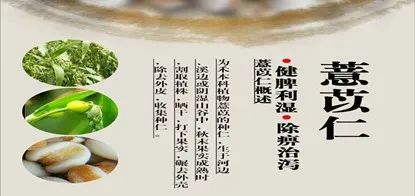
Modern Research
(1) Nutritional Value of Yiyiren
Yiyiren contains 8 essential amino acids for the human body, with proportions very close to human needs. It has been measured that every 100g of Yiyiren contains approximately 9.4g of protein, 2.7g of fat, 66.5g of carbohydrates, 0.33g of vitamin B1, 0.13g of vitamin B2, 7.9mg of niacin, 0.22mg of vitamin E, 4.9g of dietary fiber, and various minerals such as phosphorus, iron, calcium, zinc, and potassium. Additionally, Yiyiren contains 7.2% of lipid substances, with 85% being polyunsaturated fatty acids.(2) Medicinal Value of Yiyiren
⑴ Anti-cancer and anti-tumor Yiyiren contains active components that have anti-cancer and anti-tumor properties, including free fatty acids, palmitic acid, stearic acid, and oleic acid.
⑵ Anti-inflammatory and analgesic Yiyiren contains active components that have anti-inflammatory effects, helping to reduce swelling and resolve masses. When combined with Fuling and Guizhi to make Linggui Yiyiren Decoction, it has an efficacy rate of 96.5% in treating knee joint synovitis.
⑶ Clears heat and drains dampness, invigorates blood and resolves stasis Yiyiren has the ability to clear heat and detoxify, invigorate blood and resolve stasis, showing good efficacy in treating flat warts. When combined with other herbs to make Daqing Yiyiren Decoction for treating flat warts, the efficacy rate reaches 97.03%.
⑷ Multiple disease resistance The protein in Yiyiren contains various beneficial components for the human body. For example, the plant-derived proteins have good antibacterial activity and thermal stability against pathogenic fungi.
⑸ Anti-aging Yiyiren is rich in vitamin E, which has antioxidant functions, playing a crucial role in inhibiting toxic lipid peroxides, stabilizing unsaturated fatty acids, maintaining cell membrane integrity, and anti-aging.
⑹ Beauty and weight loss Modern research confirms that Yiyiren is rich in protein, vitamin B1, and B2, which can help maintain skin luster and delicacy. It has good efficacy in eliminating acne, freckles, age spots, and pregnancy spots, preventing skin peeling, cracking, and roughness.
⑺ Promotes diuresis and reduces swelling Yiyiren can promote the metabolism of blood and water in the body, with its lipid extracts such as coixol, coix oil, and coix triterpenoids having weight loss effects.
Chinese Patent Medicine
Yiyiren is the main ingredient in Yiyang Jianpi Gel, which has the effects of strengthening the spleen and benefiting the stomach, transforming dampness and resolving stagnation. It is mainly used to treat symptoms of anorexia in children, such as pale complexion, emaciation, fatigue, poor appetite, abdominal distension, and diarrhea.
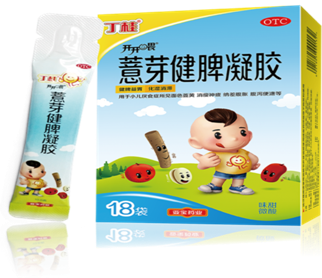
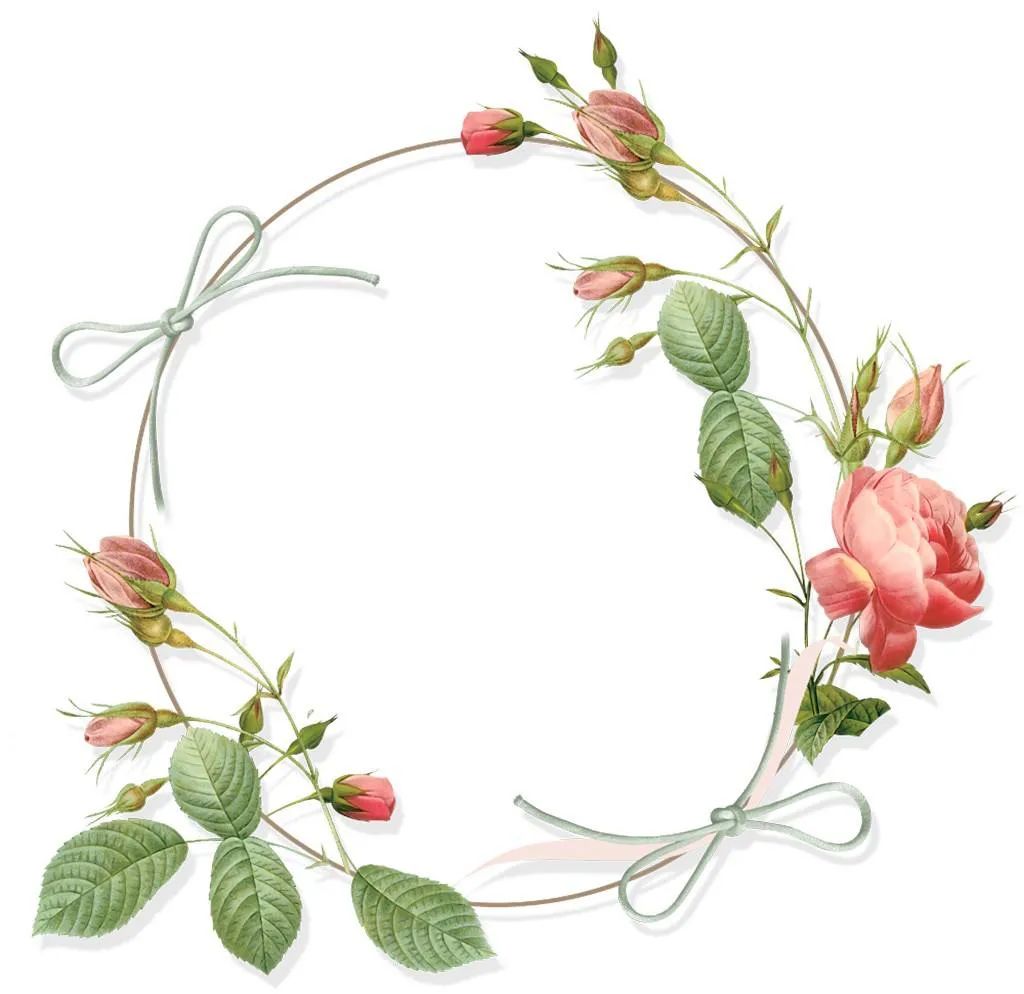
See you next time

Article provided by / School of Pharmacy
Text / Wang Yajing
Layout / Liang Yu
Review / Song Menghan
 Reprinted from the WeChat public platform of Qilu Medical College
Reprinted from the WeChat public platform of Qilu Medical College

